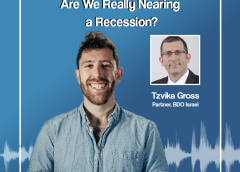
Are We Really Nearing a Recession?
[ad_1]
In my podcast, I explore the many different facets of the world of high tech from development to marketing, to sales, to entrepreneurship, all with the goal of collecting key insights on startups for listeners to gain value from this knowledge-sharing. So, what did I discover this week?
The world is going through something. Ok, that might be a big statement. At least the tech sector, for sure, is experiencing some ups and downs. Looking at last year’s unprecedented numbers, from a global standpoint, it would seem as though tech reached its peak. VCs invested a total of $643 billion, compared to $335 billion for 2020, showing an incredible increase in the total number of funds allocated to startups. Moreover, there were a record number of unicorns announced as well as venture-backed companies that went public. As a matter of fact, nearly 238 companies went public in 2021 valued at over 1 billion dollars, nearly 4 times the amount of companies in 2020.
Yet, with all the excitement in 2021, 2022 has not shown the same flare. In terms of keeping up with last year’s records, VCs are cutting down on funding rounds, companies are laying off employees in large numbers, and even others are shutting their doors for good. There are even jokes (concerning ones, at that) going around about how it may not be the time to start a startup because there seems to be no one willing to give funding.
Many professionals in the industry consider the trends we are witnessing in the tech industry to be expected. After all, what goes up must come down. However, is this a mere market correction or something that potentially could have a much bigger fallout to come?
Seeing Both Sides of the Market
“We are in the midst of everything happening right now, we have not hit rock bottom…It might evolve to something larger or more fundamental than it is, as of now, we are coming back to normal,” adds Tzvika, from what he sees in the markets. With BDO providing financial and accounting services to startups and institutional investors alike, Tzvika has a more comprehensive view of how the tech space is interacting, though he in no way is providing BDO’s official opinion on the matter or offering financial advice. While there are alarming trends that might suggest an over-correction of the market, Tzvika seems to hint that we are still ‘too early in the process” to know, but, in many ways, we are just returning to a sense of how things are supposed to work.
What we are seeing now, Tzvika suggests, even began expressing itself in the middle of 2021, just, in a certain sense, no one was paying attention. As Tzvika describes, “you could see that despite corona the markets were bubbling, money was almost not an issue. But if something is too good to be true, it isn’t true, and we could already see SPACs collapsing in mid-2021, and that’s when the hot air already started coming out.” In addition to SPACs losing steam in 2021, as 2022 neared, there appeared to be a slowdown in mega valuations and unicorn announcements, which previously had been almost a weekly occurrence in 2021. “People realized that there was something wrong,” as Tzvika puts it “and then the hot air came out” even more so than before.
The enterprise investors, primarily, along with other institutional investors stopped marking up companies and over-valuing them. Whereas rounds may have taken less time and due diligence was not as ‘diligent’ in 2021, 2022 finally knocked everything back into shape. As such, then began the decrease in valuation of funding rounds in March 2022 and an apparent decrease in liquid capital and 70-80% lower valuations than those in 2021. “VCs are still investing; money is still there but the valuations are lower.” What Tzvika emphasizes here, though, is that while this could lead to something greater, the market is simply returning to how it interacted prior to 2021 and making more sense of almost an ‘outlier year’.
What Does This Mean for Founders
The truth is that the future is still uncertain. Recalibration of the market can mean that some companies will fail- even good ones at that. However, “the market is not in a crisis like 2008, there is still money in the market, but last year was not normal and you can’t keep running like this,” Tzvika tells me. In terms of letting out the hot air, the market is doing just that. Tzvika stresses that companies should be mindful of the current market situation: rounds may not be as fast or big and they may require more intensive due diligence. If in the past year, money was freer, in today’s markets, it will not be and founders that realize this early on will be better suited to weather the storm.
Additionally, now will be the time when technology is truly tested. “Investors are coming into the market and seeing it as a market of opportunity,” Tzvika highlights when discussing the availability of funds for scaling and growth, “but they are very keen about their valuations, and they have the leverage to play hardball.” Good and strong companies can survive this, especially those with strong technology that can show to investors their innovation and unique value proposition. Investors will not be as ready to give their funds over to just any company; they will be looking to fund only those who are solving a true problem.
While this may not be the certain or definite news people are wanting to hear, Tzvika makes a very good point that, at the end of the day, the market is still in flux, and we do not know for how long the hot air will be let out. But what we do know is that 2021 has gone and successful entrepreneurs must adapt to the new realities of 2022 if they are to survive.
[ad_2]
Source link


